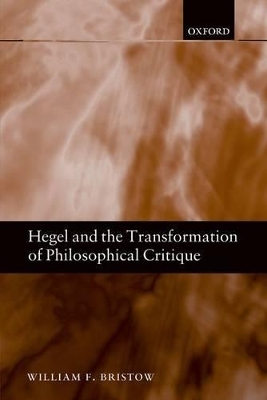
Hegel and the Transformation of Philosophical Critique
Seiten
2012
Oxford University Press (Verlag)
978-0-19-964527-5 (ISBN)
Oxford University Press (Verlag)
978-0-19-964527-5 (ISBN)
William F. Bristow presents an original and illuminating study of Hegel's hugely influential but notoriously difficult Phenomenology of Spirit (1807), one of the great works of modern philosophy. He shows that a proper understanding of this work must be founded on an understanding of its relationship to Kant's Critique of Pure Reason (1781).
William F. Bristow presents an original and illuminating study of Hegel's hugely influential but notoriously difficult Phenomenology of Spirit. Hegel describes the method of this work as a 'way of despair', meaning thereby that the reader who undertakes its inquiry must be open to the experience of self-loss through it. Whereas the existential dimension of Hegel's work has often been either ignored or regarded as romantic ornamentation, Bristow argues that it belongs centrally to Hegel's attempt to fulfil a demanding epistemological ambition.
With his Critique of Pure Reason, Kant expressed a new epistemological demand with respect to rational knowledge and presented a new method for meeting this demand. Bristow reconstructs Hegel's objection to Kant's Critical Philosophy, according to which Kant's way of meeting the epistemological demand of philosophical critique presupposes subjectivism, that is, presupposes the restriction of our knowledge to things as they are merely for us. Whereas Hegel in his early Jena writings rejects Kant's critical project altogether on this basis, he comes to see that the epistemological demand expressed in Kant's project must be met. Bristow argues that Hegel's method in the Phenomenology of Spirit takes shape as his attempt to meet the epistemological demand of Kantian critique without presupposing subjectivism. The key to Hegel's transformation of Kant's critical procedure, by virtue of which subjectivism is to be avoided, is precisely the existential or self-transformational dimension of Hegel's criticism, the openness of the criticizing subject to being transformed through the epistemological procedure.
William F. Bristow presents an original and illuminating study of Hegel's hugely influential but notoriously difficult Phenomenology of Spirit. Hegel describes the method of this work as a 'way of despair', meaning thereby that the reader who undertakes its inquiry must be open to the experience of self-loss through it. Whereas the existential dimension of Hegel's work has often been either ignored or regarded as romantic ornamentation, Bristow argues that it belongs centrally to Hegel's attempt to fulfil a demanding epistemological ambition.
With his Critique of Pure Reason, Kant expressed a new epistemological demand with respect to rational knowledge and presented a new method for meeting this demand. Bristow reconstructs Hegel's objection to Kant's Critical Philosophy, according to which Kant's way of meeting the epistemological demand of philosophical critique presupposes subjectivism, that is, presupposes the restriction of our knowledge to things as they are merely for us. Whereas Hegel in his early Jena writings rejects Kant's critical project altogether on this basis, he comes to see that the epistemological demand expressed in Kant's project must be met. Bristow argues that Hegel's method in the Phenomenology of Spirit takes shape as his attempt to meet the epistemological demand of Kantian critique without presupposing subjectivism. The key to Hegel's transformation of Kant's critical procedure, by virtue of which subjectivism is to be avoided, is precisely the existential or self-transformational dimension of Hegel's criticism, the openness of the criticizing subject to being transformed through the epistemological procedure.
William F. Bristow is Assistant Professor of Philosophy at the University of California, Irvine.
PART I HEGEL'S OBJECTION; PART II HEGEL'S TRANSFORMATION OF CRITIQUE
| Erscheint lt. Verlag | 23.2.2012 |
|---|---|
| Verlagsort | Oxford |
| Sprache | englisch |
| Maße | 156 x 234 mm |
| Gewicht | 392 g |
| Themenwelt | Geisteswissenschaften ► Philosophie ► Erkenntnistheorie / Wissenschaftstheorie |
| Geisteswissenschaften ► Philosophie ► Geschichte der Philosophie | |
| Geisteswissenschaften ► Philosophie ► Philosophie der Neuzeit | |
| ISBN-10 | 0-19-964527-2 / 0199645272 |
| ISBN-13 | 978-0-19-964527-5 / 9780199645275 |
| Zustand | Neuware |
| Haben Sie eine Frage zum Produkt? |
Mehr entdecken
aus dem Bereich
aus dem Bereich
die Grundlegung der modernen Philosophie
Buch | Softcover (2023)
C.H.Beck (Verlag)
18,00 €
Vorlesung Wintersemester 1951/52. [Was bedeutet das alles?]
Buch | Softcover (2023)
Reclam, Philipp (Verlag)
7,00 €


